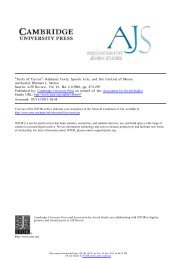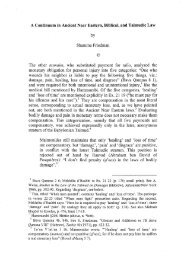Torah in the Mouth.pdf
Torah in the Mouth.pdf
Torah in the Mouth.pdf
Create successful ePaper yourself
Turn your PDF publications into a flip-book with our unique Google optimized e-Paper software.
<strong>Torah</strong> <strong>in</strong> <strong>the</strong> <strong>Mouth</strong>, Writ<strong>in</strong>g and Oral Tradition <strong>in</strong> Palest<strong>in</strong>ian Judaism, 200 BCE - 400 CE<br />
Jaffee, Mart<strong>in</strong> S., Samuel and Al<strong>the</strong>a Stroum Professor of Jewish Studies, University of Wash<strong>in</strong>gton<br />
Pr<strong>in</strong>t publication date: 2001, Published to Oxford Scholarship Onl<strong>in</strong>e: November 2003<br />
Pr<strong>in</strong>t ISBN-13: 978-0-19-514067-5, doi:10.1093/0195140672.001.0001<br />
end p.69<br />
pour<strong>in</strong>g it <strong>in</strong>to his cook<strong>in</strong>g.<br />
[The disciple] said to him: What are you do<strong>in</strong>g?<br />
He replied: I am [behav<strong>in</strong>g as] 23 a High Priest who eats his heave offer<strong>in</strong>g <strong>in</strong> a state of purity!<br />
[The disciple] asked: This stove-range—is it <strong>in</strong> a state of impurity or purity?<br />
He replied: Do we have a case <strong>in</strong> <strong>the</strong> <strong>Torah</strong> <strong>in</strong> which a stove-range can become unclean? Ra<strong>the</strong>r it speaks of an unclean oven, for<br />
it is said [of an ear<strong>the</strong>n vessel]: “everyth<strong>in</strong>g <strong>in</strong>side it shall be unclean” (Lev.11:33) [and we don't put th<strong>in</strong>gs <strong>in</strong>side a stove-range]!<br />
[The disciple] replied: Just as <strong>the</strong> <strong>Torah</strong> has spoken about an oven that has become unclean, so has it spoken of a stove-range<br />
that has become unclean, for it is said: “Everyth<strong>in</strong>g on which <strong>the</strong> carcass of any of <strong>the</strong>m falls shall be unclean: an oven or stove-<br />
range shall be smashed” (Lev.11:35)!<br />
[The disciple] cont<strong>in</strong>ued: If this is how you conduct yourself, you've never eaten food <strong>in</strong> purity for a s<strong>in</strong>gle day of your life!<br />
Here <strong>the</strong> unfortunate pietist has misunderstood one scriptural text and overlooked ano<strong>the</strong>r, with grave consequences for his efforts to live<br />
at a high standard of cultic purity. What has led to his imperfect grasp of <strong>the</strong> simple text of Scripture? His failure to see <strong>the</strong> scriptural<br />
commandment embodied <strong>in</strong> <strong>the</strong> practice of an authoritative teacher. The po<strong>in</strong>t of <strong>the</strong> tale is that, while <strong>the</strong> text of Scripture is certa<strong>in</strong>ly<br />
<strong>the</strong>re for all to read, it is understood only <strong>in</strong> <strong>the</strong> context of <strong>the</strong> teach<strong>in</strong>g of <strong>the</strong> Sage whose repeated teach<strong>in</strong>gs br<strong>in</strong>g <strong>the</strong> written text to life.<br />
A toseftan passage nicely illustrates <strong>the</strong> dist<strong>in</strong>ction between “recit<strong>in</strong>g” Scripture and “repeat<strong>in</strong>g”mšnh as well as <strong>the</strong> status equavalence of<br />
<strong>the</strong> recited and repeated curricula as sources of religious knowledge. At issue is a person who has suffered a form of bodily discharge that<br />
normally conveys a degree of impurity that, <strong>in</strong> <strong>the</strong> time of <strong>the</strong> Temple, would have barred <strong>the</strong> person from enter<strong>in</strong>g <strong>the</strong> sacred prec<strong>in</strong>cts. In<br />
<strong>the</strong> present era, shall <strong>the</strong> impurity disqualify <strong>the</strong> victim from utter<strong>in</strong>g holy words dur<strong>in</strong>g <strong>the</strong> period of contam<strong>in</strong>ation? The text dist<strong>in</strong>guishes<br />
between persons whose impurity is <strong>in</strong>sufficient to disqualify <strong>the</strong>m from sacred study and those whose status is too virulent to permit <strong>the</strong><br />
utterance of holy words (T. Berakhot 2:12):<br />
1. A male with a genital discharge, and a female with a genital discharge, and <strong>the</strong> menstruant, and <strong>the</strong> parturient are permitted to recite<br />
We shall not be deta<strong>in</strong>ed here by <strong>the</strong> text's surpris<strong>in</strong>g assumption—surpressed <strong>in</strong> later versions of <strong>the</strong> passage—that women would be<br />
recit<strong>in</strong>g from Scripture or repeat<strong>in</strong>g rabb<strong>in</strong>ic traditions. 24 The po<strong>in</strong>t here is that <strong>the</strong> Toseftan tradition assumes a ra<strong>the</strong>r reified curriculum of<br />
rabb<strong>in</strong>ic learn<strong>in</strong>g, all of which is mastered <strong>in</strong> some sense through verbal repetition, and all of which should not be sounded through unclean<br />
lips.<br />
While it is not clear precisely how this passage draws its dist<strong>in</strong>ctions between, say, repeated tradition [ mšnh] on <strong>the</strong> one hand and<br />
halakhic tradition [hlkh] on <strong>the</strong> o<strong>the</strong>r (especially unit 2), it is certa<strong>in</strong> that both are subsumed under <strong>the</strong> nonscriptural category of learn<strong>in</strong>g<br />
that is <strong>the</strong> unique doma<strong>in</strong> of <strong>the</strong> Sage. What seems to concern Rabbi Yose is that <strong>the</strong> person with <strong>the</strong> emission should be excluded from<br />
<strong>the</strong> fullest participation <strong>in</strong> <strong>the</strong> life of learn<strong>in</strong>g until his impurity is cleansed. Thus he might repeat his traditions, but he may not engage <strong>in</strong><br />
dialectical explanation of <strong>the</strong> details.<br />
The specific verbal details, <strong>in</strong> fact, seem to have been important. While <strong>the</strong> occasional claim that Sages memorized <strong>the</strong>ir teacher's words<br />
and reported <strong>the</strong>m verbatim is without real foundation, 25 it seems clear that <strong>the</strong> shapers of Mishnaic and Toseftan traditions valued <strong>the</strong><br />
ability to report repeated traditions <strong>in</strong> relatively fixed verbal formulas. 26 As is clear from <strong>the</strong> follow<strong>in</strong>g example, <strong>in</strong>volv<strong>in</strong>g <strong>the</strong> early second-<br />
century circle surround<strong>in</strong>g Rabbi Aqiva, disputes about legal substance could<br />
end p.70<br />
from [lqrwt b- ] <strong>the</strong> <strong>Torah</strong>, <strong>the</strong> Prophets, or from <strong>the</strong> Writ<strong>in</strong>gs and to repeat from [lšnwt b- ] repeated tradition [mšnh], from exegetical<br />
tradition [mdrš ], from halakhic tradition [hlkh], and from homiletical tradition ['gdh]—but those with a sem<strong>in</strong>al discharge are prohibited<br />
from all of <strong>the</strong>se.<br />
2. Rabbi Yose says: But [<strong>the</strong> person with <strong>the</strong> discharge] may repeat his customary halakhic traditions, as long as he does not amplify <strong>the</strong><br />
repeated tradition [but merely sets it forth verbally].<br />
at times be grounded <strong>in</strong> divergencies <strong>in</strong> <strong>the</strong> memorization of formulaic patterns of speech. At issue is a detail of <strong>the</strong> Second Temple<br />
sacrificial cult, about which <strong>the</strong>re was apparently no eyewitness testimony.<br />
When deputations of priests from local villages were called up for rotation <strong>in</strong> <strong>the</strong> Temple sacrificial cult, local townspeople would recite <strong>the</strong><br />
<strong>Torah</strong> <strong>in</strong> <strong>the</strong>ir villages <strong>in</strong> correspondence to selected moments of <strong>the</strong> Temple service, while o<strong>the</strong>rs would travel to Jerusalem with <strong>the</strong><br />
priests to act as witnesses to <strong>the</strong> offer<strong>in</strong>gs. At issue <strong>in</strong> <strong>the</strong> present passage is <strong>the</strong> precise word<strong>in</strong>g of a repeated tradition regard<strong>in</strong>g<br />
variations of <strong>the</strong> activities of <strong>the</strong> nonpriestly delegation.<br />
All authorities have mastered a list of at least three liturgical activities (<strong>the</strong> s<strong>in</strong>g<strong>in</strong>g of <strong>the</strong> Hallel psalms, <strong>the</strong> Additional Sacrificial Offer<strong>in</strong>g,<br />
PRINTED FROM OXFORD SCHOLARSHIP ONLINE (www.oxfordscholarship.com). (c) Copyright Oxford University Press, 2003 - 2011. All Rights Reserved.<br />
Under <strong>the</strong> terms of <strong>the</strong> licence agreement, an <strong>in</strong>dividual user may pr<strong>in</strong>t out a PDF of a s<strong>in</strong>gle chapter of a monograph <strong>in</strong> OSO for personal use (for details<br />
see http://www.oxfordscholarship.com/oso/public/privacy_policy.html).<br />
Subscriber: Columbia University; date: 20 September 2011

















